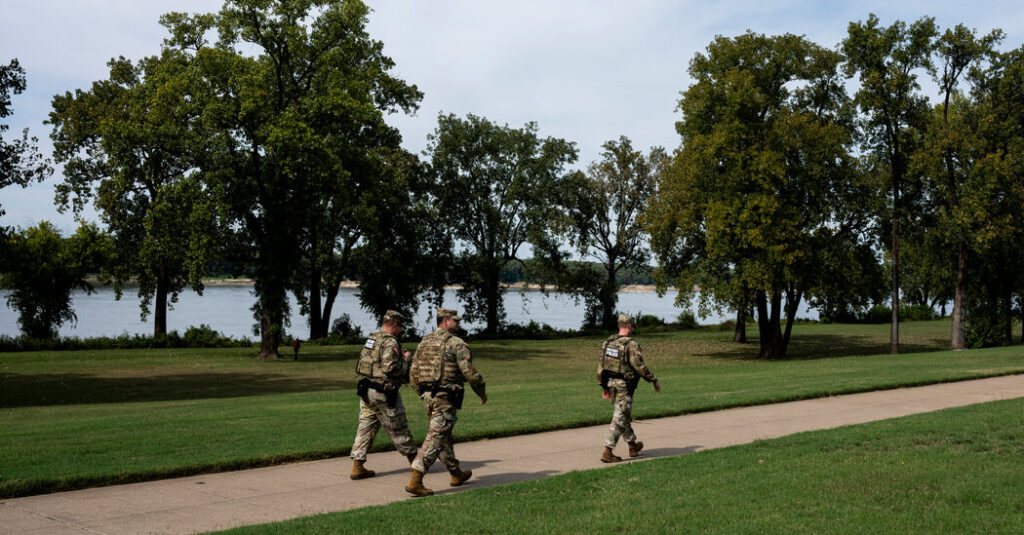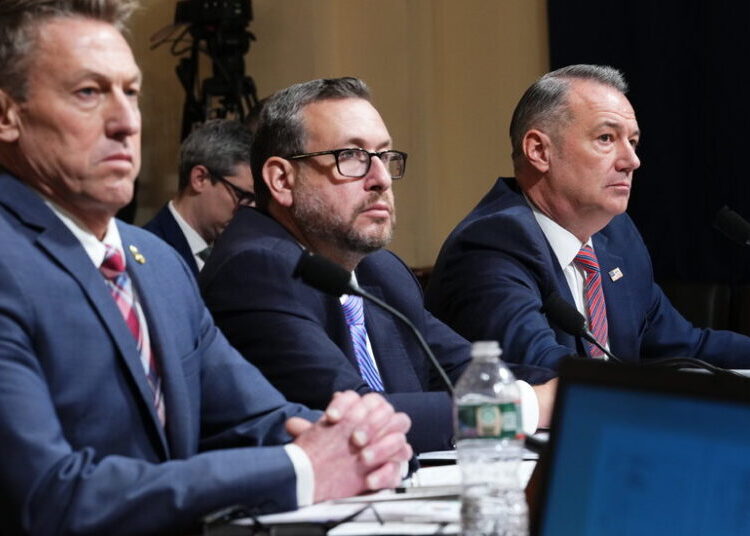A Tennessee judge on Monday temporarily blocked the deployment of the National Guard in Memphis, siding with state and local lawmakers who argued that Gov. Bill Lee had overstepped his constitutional authority in sending troops to the city.
The ruling adds to a tangled legal landscape regarding the deployment of National Guard troops in several American cities this fall, either by the Trump administration or at its behest. Local and state officials have pushed back against the use of troops in Democratic-led cities that President Trump has described as overrun by crime.
In Tennessee, seven elected officials went to state court and challenged Mr. Lee, a Republican who deployed the Guard after Mr. Trump said he wanted to crack down on crime in Memphis. Other cities, including Chicago and Portland, Ore., have had the backings of Democratic governors in opposing such deployments.
“The power committed to the governor as commander in chief of the Army and militia is not unfettered,” Chancellor Patricia Head Moskal of Davidson County Chancery Court wrote in her opinion. And, she wrote, “this case raises important questions concerning the use of the state’s military forces for domestic law enforcement purposes.”
It was not immediately clear whether the state would appeal. Spokeswomen for Mr. Lee and Attorney General Jonathan Skrmetti did not immediately respond to requests for comment.
The ruling does not affect the rest of a federal task force that the Trump administration dispatched to Memphis this fall to address crime, which at least 150 National Guard troops are supporting. The task force includes agents from the F.B.I., the Drug Enforcement Administration and the Bureau of Alcohol, Tobacco, Firearms and Explosives.
Notably, Mayor Paul Young, a Democrat, did not join the lawsuit. While he has expressed opposition to the National Guard deployment and defended the city’s efforts to counter crime, he has also emphasized wanting “to ensure that we have influence in how they engage in this community.”
The plaintiffs are Mayor Lee Harris of Shelby County; Councilman JB Smiley Jr. of Memphis; Erika Sugarmon and Henri E. Brooks, both Shelby County commissioners; State Representatives Gabby Salinas and G.A. Hardaway of Memphis; and State Senator Jeff Yarbro of Nashville. All are affiliated with the Democratic Party.
The National Immigration Law Center and Democracy Forward, a liberal-leaning legal nonprofit involved in dozens of lawsuits against the Trump administration, are providing legal representation.
“This is a positive step toward ensuring the rule of law applies to everyone, including everyday Tennesseans and even the governor,” Mr. Harris wrote on social media, though he cautioned that the state could still appeal.
The plaintiffs argued that because there was no evidence of “rebellion or invasion” — which the State Constitution cites as proper reasons for deploying “militia” — Mr. Lee had exceeded his constitutional authority. They also noted that he had not formally notified or sought input from the Memphis City Council, the Shelby County Commission or the General Assembly about the deployment.
“The governor’s unilateral decision to deploy troops to militarily occupy an American city is as unlawful as it is shocking,” Joshua Salzman, a lawyer with Democracy Forward, told Chancellor Moskal during a hearing in early November. Communities, he added, suffer “a real harm, both economic and psychological and reputational” when they are viewed as “being under military occupation.”
Cody Brandon, a lawyer with the Tennessee Attorney General’s office, noted at the hearing that the plaintiffs were being represented by out-of-state groups. He defended Mr. Lee’s authority to summon the National Guard and said restricting that ability could prove dangerous.
A governor, Mr. Brandon said, must have the power to “mobilize the guard on the rare occasions it’s necessary without her or his political competitors disrupting the chain of command through litigation.”
Under questioning from the chancellor, Mr. Brandon acknowledged that he was not aware of a formal written directive from Mr. Lee deploying the Guard. But he said that operational instructions had been issued.
In her ruling, Chancellor Moskal noted that the official record contained “only indirect requests or proposals for such requests” to or from Mr. Lee.
Mr. Lee’s decision to send the National Guard into Memphis has vexed many residents of the majority Black city, especially those who remember when troops were sent there in 1968, during a sanitation workers’ strike and after the Rev. Dr. Martin Luther King Jr.’s assassination.
Since Guard troops arrived on Oct. 10, they have largely patrolled popular tourist destinations, at times posing for pictures with people walking by.
Troops cannot make arrests or execute warrants, unlike the hundreds of federal agents who have also been dispatched to the city of 610,000. Those agents have been deputized under the leadership of the U.S. Marshals Service. They have worked on teams with local law enforcement officials.
“Neither ‘grave emergency’ nor ‘disaster’ can fairly be construed to include ‘ongoing criminal activity’ — which plainly is a law enforcement concern — and is not the type of emergency that would warrant the activation and deployment of National Guard members who are not trained law enforcement personnel,” Chancellor Moskal wrote. Their lack of law enforcement authority, she wrote, bolsters that conclusion.
The teams have made more than 2,600 arrests, according to a spokesman for the task force. Some have taken place after traffic stops over broken taillights or other minor infractions, raising concerns about unfair targeting. Fears about immigration enforcement, a focus of federal deployments elsewhere in the country, have also spread in Memphis.
Some in the city have said that despite a reported decrease in crime before the arrival of the federal task force and the National Guard, their presence has been helpful in addressing persistent crime.
Emily Cochrane is a national reporter for The Times covering the American South, based in Nashville.
The post Tennessee Judge Temporarily Blocks National Guard Deployment in Memphis appeared first on New York Times.




